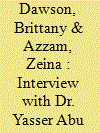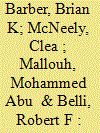|
|
|
Sort Order |
|
|
|
Items / Page
|
|
|
|
|
|
|
| Srl | Item |
| 1 |
ID:
144595


|
|
|
|
|
| Summary/Abstract |
This October 2015 interview with director of the Gaza Community Mental Health Programme (GCMHP) Dr. Yasser Abu Jamei addresses how mental health professionals care for themselves and each other in an environment with little break from sustained conflict. Mental health workers in the Gaza Strip must cope with the resource shortage generated by the Israeli blockade and their own trauma while aiding others. The United Nations Children's Emergency Fund (UNICEF) estimates that over one-third of Gaza's children require direct and specialized psychosocial support as a result of Israel's Operation Protective Edge (OPE), the fifty-day war on Gaza in the summer of 2014, and earlier assaults. GCMHP provides services free of charge at clinics, community centers, and by phone via a twenty-four-hour hotline, and since its founding, has served more than twenty thousand Gazans with capacity-building programs and trainings, community education, scientific research, and human rights advocacy. GCMHP provided mental health support to the community both during and after each of the three large-scale Israeli assaults on Gaza (in 2008, 2012, and 2014), helping the community to work through both collective and individual trauma. Over twenty-one hundred Palestinians, five hundred of them children, were killed during OPE and another eleven thousand injured. During OPE an airstrike killed twenty-eight members of Abu Jamei's extended family, including nineteen children, as they broke their Ramadan fast. It was the largest loss of life within a single family at that point in the war. The structural damage was similarly catastrophic, leaving over one hundred thousand Gazans homeless. Long after the cease-fire, the psychological wounds sustained during consecutive assaults continue to disrupt everyday life.
|
|
|
|
|
|
|
|
|
|
|
|
|
|
|
|
| 2 |
ID:
144593


|
|
|
|
|
| Summary/Abstract |
This article summarizes a uniquely thorough study of the first generation of Palestinians to have lived the whole of their lives under occupation. Findings from group interviews and large, representative surveys of men and women from the West Bank, East Jerusalem, and the Gaza Strip in 2011 draw a complex portrait of day-to-day life both currently and historically, including: widespread political activism that they continue to prize; high levels of exposure to often demeaning political violence and restriction of movement; limited access to basic resources, low employment stability and poverty; high levels of social cohesion, but also of lack of safety, political instability, fear for the future, stress, and feeling broken. Most were not optimistic in 2011 about the peace process but remained, confident in their ability to manage what the future brings. The findings also show that each of the three territories has unique types and levels of challenges.
|
|
|
|
|
|
|
|
|
|
|
|
|
|
|
|
|
|
|
|
|